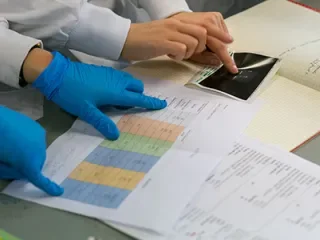How to Apply to Research Postgrads
Information for New and Prospective Research Postgrads
How to Register Interest
There are two ways in which you can join the Postgraduate community in DkIT.
- If you meet the criteria, you can apply to any of our open postgraduate positions.
- You can apply to join the Postgraduate register based on the submission of a proposal of your own research topic.
Before you can to register as a Research Postgraduate Student you must first seek the support of the appropriate DkIT School in which you propose to conduct your research. This support includes identifying a suitable Supervisor who is willing to support and guide you through a Postgraduate degree.
Postgraduate FAQs
Funding Schemes
There are several competitive funding schemes to which prospective Postgraduates can apply. These usually run an annual basis and full details can be found via the links below. If you are interested in applying to any of these schemes to conduct your postgraduate research at DkIT, it is important that you contact the DkIT Research Office as early as possible.
1. Government of Ireland Postgraduate Scholarship
This programme provides outstanding students with the opportunity to direct their own research at the early-career stage, working with a supervisor, in their chosen area of interest. The Programme is highly competitive, with an average success rate of 19% over the last five years.
Successful applicants who become scholars under the programme are recognised as demonstrating world-class potential as future research leaders and in the quality of their ideas.
2. Employment-Based Postgraduate Programme- closed
Combining excellent research with workplace experience, the Irish Research Council’s Employment-Based Postgraduate Programme is a unique national initiative. First piloted in 2012, it provides students in all disciplines with an opportunity to bring great research ideas into an Irish employment partner, with the support of a higher education institution. Employment partners host excellent researchers who dedicate their time to a specific research project related to the organisation.
3. Enterprise Partnership Scheme
The Irish Research Council’s Enterprise Partnership Scheme is a unique national initiative linking excellent researchers to enterprise. The scheme co-funds awardees to bring great research ideas into an enterprise with the support of a higher education institution.
4. DkIT Postgraduate Scholarship - Internal Scheme
Applying to the Postgraduate Research Register
There are several competitive funding schemes to which prospective Postgraduates can apply. These usually run an annual basis and full details can be found via the links below. If you are interested in applying to any of these schemes to conduct your postgraduate research at DkIT, it is important that you contact the DkIT Research Office as early as possible.

Step 1: Prior to submitting an application to register as a Research Postgraduate Student or to apply for internal or external postgraduate funding, candidates must first consult with the appropriate DkIT School in which they propose to conduct their research. They must also have identified and be supported in their application by a suitable supervisor.
Step 2: Applicants must submit a completed Application for Admission to the Postgraduate Research Register Form (PGR2) to the Graduate Studies Office, along with a copy of their Letter of Offer from their funding body (if applicable), copies of their transcripts/proof of Degree. Please note, for International Students, additional requirements will apply as per below.
Step 3: Applications are reviewed and approved by the Graduate Research Supervisory Board, which meet every two months.
Step 4: If approved, applicants will be contacted by the DkIT Admissions office who will invite you to register, pay fees and arrange the issuance of your Student Card. In most cases, Students at DkIT will be placed on either the Masters or PhD-Track register. Transfer to the PhD Register dependant on the successful completion of a PhD Transfer Exam. For further details please see our section on Transfer to the PhD Register and the Academic Regulations Policy.
Step 5: Applicants should contact the Graduate Studies Office to arrange set up.
Step 6: Scholarship Exemption forms should be completed and returned to Revenue.ie. If you do not currently have a PPSN’s are issued by the Department of Social & Family Affairs, Client Identity Services. Further details & application forms are available by calling +353 1 7043281 or emailing [email protected].
Step 7: Once registration is complete, all postgraduate Students must register on DkIT’s Research Management System. Please refer to our RMS guide for details on how to register.
Additional Requirements for International Students:
Candidates wishing to apply for admission to the Postgraduate Research Register from outside of The Irish State are subject to several additional requirements in order to be considered for approval.
- All candidates are responsible for confirming and arranging their own Visa/Entry requirements to the Republic of Ireland. Please contact the Graduate Studies office for any support documentation which The Institute may need to supply to support your Visa application.
- Candidates holding Academic Qualifications from outside of The State will be assessed using the NARIC guidelines and the European Framework of Qualifications.
- Candidates whose first language is not English must provide a recent (within 12 months) minimum proficiency in English at 6.5 on the IELTS scale (or equivalent) in order to ensure that there is no language or written barriers between the student and supervisory team which may hinder the progress of the research.
- Candidates whose first language is not English but have acquired their primary degree through the medium of English are not subject to this requirement.
